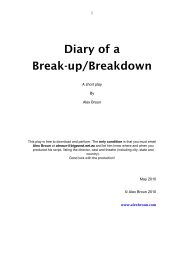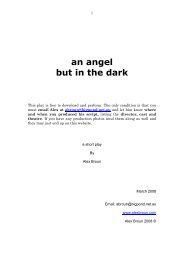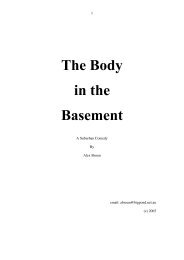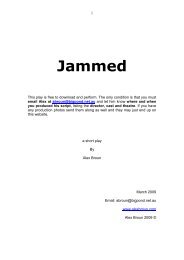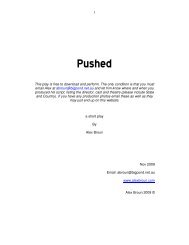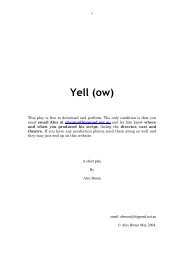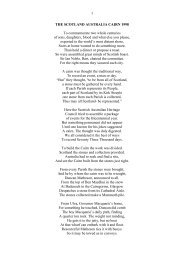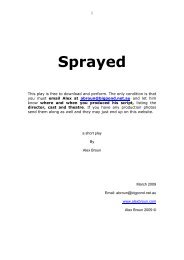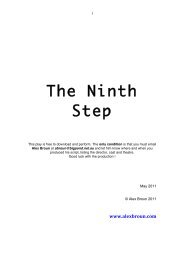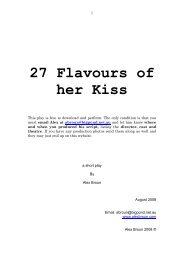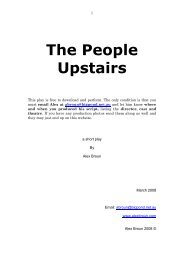THE WAR ON DRUGS by Malcolm D. Broun OAM QC ... - Alex Broun
THE WAR ON DRUGS by Malcolm D. Broun OAM QC ... - Alex Broun
THE WAR ON DRUGS by Malcolm D. Broun OAM QC ... - Alex Broun
You also want an ePaper? Increase the reach of your titles
YUMPU automatically turns print PDFs into web optimized ePapers that Google loves.
3In the drug trade as distinct from tobacco, there is no significant amount of televisionor radio advertising discouraging customers although there is a quite effective degreeof television and radio material advertising the penalties and risks of the drug trade.That advertising through radio and television news programs, is not getting much of amessage through to dealers and distributors. It rather perhaps confirms the social ideathat the drugs must be of interest because they are so expensive and the dealer anddistributor is taking risks to bring the goods to the customer.There are of course some news programs that emphasise the bad consequences of useof the drugs. They are usually, however, current affairs programs on health issues andnot in ordinary news programs and not television or radio advertising. The manymillions of dollars that would be required for an effective television and radiocampaign would be a troublesome budget item for Federal and State Governments.Customers who are already seriously addicted to the marketed drugs, are usually toolate to be saved <strong>by</strong> advertising material however well presented or however graphic.Accordingly, the next front of the belligerents in the war on drugs is treatment for thecustomers. This is equivalent to a field hospital for the wounded. If a customermanages to get his supplies and is available still alive as a purchaser in the market, hewill probably need medical or hospital care or at least some sort of therapy. The mostcommon therapy is to turn the government into the largest drug dealer. Themethadone treatment is highly expensive and its justification is just that methadonekeeps the drug addicts stable with a less serious but similar drug. This is nothing new.The tobacco industry has been paying taxes to the government to help the governmentto pay for all the medical treatment and therapy for heavy smokers. In fact probablyin broad terms, the medical therapy and hospital expenses for treatment for smokersstill outweighs the already considerable expenses of medical and hospital treatmentfor illegal drugs.But the special expense or separate category of expense for hospitals and medicaltreatment for drug users are usually costed as part of the ordinary government expenseof maintaining a medical services system and maintaining hospitals. It would be verydifficult to work out the enormous cost to the community of therapy and
4hospitalisation for drug users. But for the drug trade, there is no tax to compensatethe government for the costs in hospitals and medical therapy or treatment for drugusers. At least the government is getting something out of the taxes towards theenormous costs of smoking in hospitalisation and medical treatments.The alcohol trade similarly has heavy taxes to the government which provides somecontribution to the government for the costs of hospitalisation or treatment or therapyfor long-term alcoholics.Since the war on drugs is not achieving anything against the customers, it would seemsensible for the government to be able to collect money <strong>by</strong> way of a tax from thedealers and distributors to help the cost to the public for the drug users’ therapy andhospitalisation.The issue is substantially the same whether it is cocaine, tobacco, or alcohol. There isgoing to be a continuing cost for hospitalisation and therapy and treatment for thoseaddicted to alcohol tobacco or illicit drugs.Governments have not been willing to provide the same basically sensible solutions.King James I tried to persuade British citizens in the 17 th Century that tobacco was anevil and that it should be discouraged. Eventually governments have accepted thatthere are real health problems in tobacco which has increased the government’sinterest in taxes from tobacco. King James I imposed taxes on tobacco – or rather anexcise in respect of the importation of tobacco – but that was and remained primarilya revenue raising method not a means of funding healthcare.Both alcohol and tobacco have very large healthcare and treatment care costs andgovernments try to raise money for those healthcare and hospital costs to the extentthat the public will accept the level of those taxes.The war is ongoing. It is clear it will never succeed in a victory. The risks of thetrade <strong>by</strong> criminal proceedings has not stopped the dealers. Criminal procedures haveonly the effect of increasing the price of the drugs on the market, and it seems theprofit margins on the hard drugs: marijuana (if it is still thought of as a hard drug),
6We cannot fill our jails and courts with the customers of the drug trade. There willcontinue to be great costs of enforcement, and great costs of jail terms and prisons.Every million dollars spent on every big drug bust is that much money that thegovernment cannot spend on education or payment for the costs of medical treatmentor rehabilitation of the drug addicts. There is almost universal acceptance that victimsof the drug trade should be helped. Education as to the bad effects of hard drugs hasnot stopped the trade. Medical treatment and hospitalisation is a continuing expenseand rehabilitation is expensive.Since a drug trial is going to cost more to the government than a murder trial, and athat criminal investigations in the drug trade is much more expensive than anynumber of break and enters or bank hold ups. Should we not follow from theexperience of the tobacco industry and from alcohol producers in getting thecustomers to pay high taxes at least equivalent to the profit which the drug dealers anddistributors make? The taxes have to be assessed so that they are really adiscouragement to the purchaser but on the other hand, endeavour to compensate thegovernment or the country from the enormous cost of the drug trade <strong>by</strong> spending themoney raised not on the dealers and distributors as compensation for their risks but tocompensate the government for cost of hospital and medical care that the addicts needand hopefully education.A high powered and well run advertising campaign on radio, television andnewspapers to educate the customers of the drug trade would be a much cheaper wayof trying to stop the drug trade, than the now very expensive and generallyunsuccessful war.The social consequences of disease and illness is much the same for tobacco andalcohol abuse on the one hand and illicit drugs on the other. It may be a difficultcalculation as to which costs the most. Criminalisation is not working against drugs,as it never did against tobacco or alcohol abuse. Illegal and legal abuse substancesneed hospital care, medical services. Both could use as much education as can beafforded. We are apparently making a distinction that people who work it the tobaccoand liquor industry are nicer people than hard drug dealers. That is just aconsequence of criminalisation.
7Governments have a choice. Should we spend millions on police, trials, lawyers andcosts of maintaining prisoners for years or do we need to spend millions on educationor advertising the harm that hard drugs do, and hospitals, and treatment. It seemsthere are not enough millions to do both.



